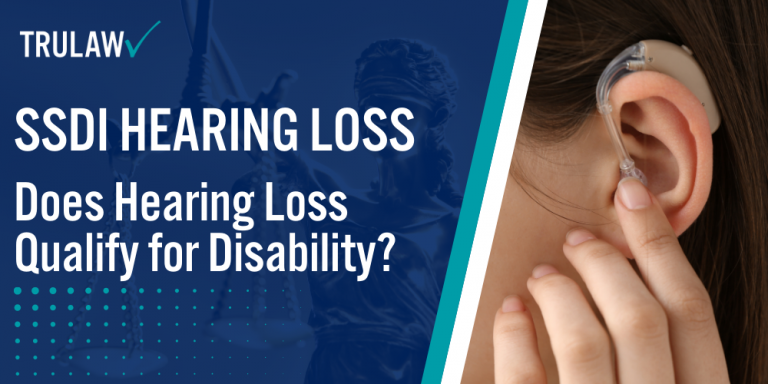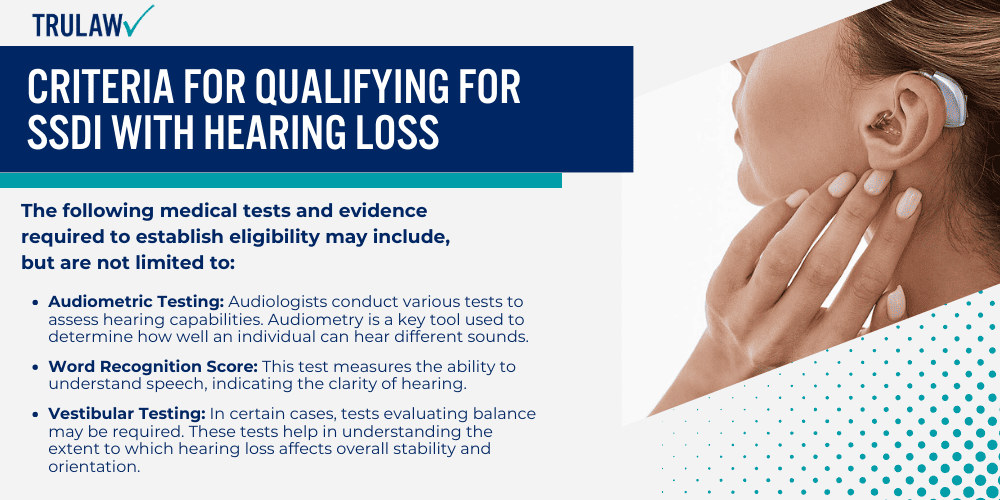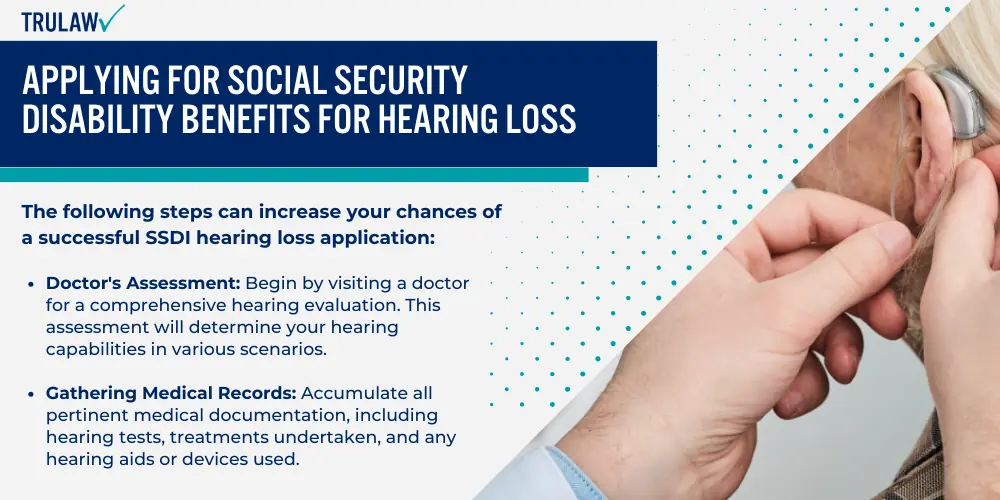SSDI Hearing Loss: Does Hearing Loss Qualify for Disability?
- Last Updated: July 14th, 2025

Attorney Jessica Paluch-Hoerman, founder of TruLaw, has over 28 years of experience as a personal injury and mass tort attorney, and previously worked as an international tax attorney at Deloitte. Jessie collaborates with attorneys nationwide — enabling her to share reliable, up-to-date legal information with our readers.
Legally Reviewed
This article has been written and reviewed for legal accuracy and clarity by the team of writers and legal experts at TruLaw and is as accurate as possible. This content should not be taken as legal advice from an attorney. If you would like to learn more about our owner and experienced injury lawyer, Jessie Paluch, you can do so here.
Fact-Checked
TruLaw does everything possible to make sure the information in this article is up to date and accurate. If you need specific legal advice about your case, contact us by using the chat on the bottom of this page. This article should not be taken as advice from an attorney.
Key takeaways:
- To get SSDI for hearing loss, your condition must meet strict Social Security guidelines. This includes having specific audiometric test results.
- Tests like pure tone audiometry and word recognition help show if you can't hear well enough to work.
- Appeals are possible if initial SSDI applications for hearing loss are denied.
Overview of SSDI Hearing Loss Benefits
Question: What are the SSDI hearing loss requirements to receive benefits?
Answer: To qualify for Social Security Disability Insurance (SSDI) benefits for hearing loss, individuals must meet specific criteria outlined by the Social Security Administration (SSA).
On this page, we’ll discuss this question in further depth, provide an overview of SSDI hearing loss benefits, criteria for measuring hearing loss, evidence needed to qualify SSDI hearing loss benefits, and much more.

SSDI Hearing Loss: Evaluation Process
According to the SSA, an otologic examination and audiometric testing are used to evaluate hearing loss.
The Speech Reception Threshold (SRT) and word recognition testing are also utilized.
If you or a loved one are filing an SSDI application or appeal, contact TruLaw today using the chat on this page to receive an instant case evaluation.
Discover how the SSDI Lawyers within TruLaw’s legal network can help you today.
Table of Contents
SSDI Hearing Loss as a Disability
Hearing loss can make it tough to work and do everyday things.
If your hearing is really bad, you might be able to get money from SSDI.
This is a program for people who have worked before but now can’t because of their disability.
To get this help, your hearing loss must be very serious.
SSDI looks at how well you can hear sounds and understand words.
They use special tests like pure tone audiometry and word recognition testing.
Your doctor will check if sounds need to be really loud for you to hear them in one or both ears.
They also see how many words you can know when someone says them – even with noise around.
If your tests show that hearing is really hard for you, SSDI may say yes, you have a disability because of hearing loss.
Criteria for Qualifying for SSDI Hearing Loss Benefits
To be eligible for SSDI hearing loss benefits, applicants must meet specific guidelines that assess the severity and impact of their condition.
These benchmarks are outlined by the Social Security Administration and hinge on audiometric test results, communication abilities, and whether medical interventions like cochlear implants have been attempted.

SSDI Hearing Loss: Eligibility to File a Claim
Hearing loss can significantly impact an individual’s ability to work and perform daily activities, qualifying them for Social Security Disability Insurance (SSDI) benefits.
The following medical tests and evidence required to establish eligibility may include, but are not limited to:
- Audiometric Testing: Audiologists conduct various tests to assess hearing capabilities. Audiometry is a key tool used to determine how well an individual can hear different sounds.
- Word Recognition Score: This test measures the ability to understand speech, indicating the clarity of hearing.
- Vestibular Testing: In certain cases, tests evaluating balance may be required. These tests help in understanding the extent to which hearing loss affects overall stability and orientation.
- Medical Record Evidence: Documentation should include any treatments or devices used, such as cochlear implants or hearing aids. The effectiveness of these aids in facilitating normal tasks or employment is a critical factor in the SSDI claim.
- Doctors’ Notes and Treatment History: Detailed notes on any ear surgeries, infections, or other relevant medical interventions are vital. They provide a comprehensive view of the individual’s hearing loss condition and treatment efforts.
The Social Security Administration uses this evidence to determine if the hearing loss is severe enough to warrant SSDI benefits.
It’s important that the documentation clearly illustrates how the hearing loss impacts the individual’s ability to work and manage daily life.
Blue Book Listings
The Social Security Administration (SSA) uses a guide called the “Blue Book” to help decide if someone’s hearing loss is bad enough for SSDI.
This book has strict rules on how much you can’t hear or understand words to get benefits.
For example, scores from hearing tests need to show that your average hearing threshold sensitivity in your better ear is very poor.
Also, word recognition must be low; you might have to score less than 40% correct on standardized words lists, even with a hearing aid.
You’ll need special medical exams like audiometric testing and auditory evoked response testing.
The SSA wants this proof before saying yes to your disability claim.
If these tests prove severe or profound hearing loss, social security benefits may support you financially due to inability in maintaining employment because of the disability.
Impact of Specific Medical Tests on Your Case
Medical tests for hearing loss are key in showing how much your hearing has been affected.
An audiologist will do these tests and look at things like how well you hear different sounds and words.
If a bone conduction test finds that sound passing through the bone is much better than through the air, it suggests that there’s a problem with the outer or middle ear.
For SSDI, you need to have solid proof from these tests to show severe hearing loss.
This includes having word recognition scores or being unable to hear certain tones at specific volumes.
The SSA uses this information to decide if your hearing loss stops you from working.
Your doctor’s reports also play a big part in supporting your case for disability benefits due to hearing loss.
Is Tinnitus Considered a Disability?
Tinnitus can make life very hard.
This condition causes a ringing in the ears that doesn’t go away.
It can be loud enough to get in the way of your daily work and rest.
Some people with tinnitus might qualify for disability benefits from the Social Security Administration (SSA).
The SSA looks at how bad your tinnitus is and if you meet their rules.
They want medical proof that shows your tinnitus stops you from working like before.
If this is true for you, then you could get money each month to help out, and possibly health care benefits like Medicare or Medicaid too.
Applying for Social Security Disability Benefits for Hearing Loss
Applying for Social Security Disability Insurance (SSDI) with hearing loss can be a process.

The following steps can increase your chances of a successful SSDI hearing loss application:
- Doctor’s Assessment: Begin by visiting a doctor for a comprehensive hearing evaluation. This assessment will determine your hearing capabilities in various scenarios.
- Gathering Medical Records: Accumulate all pertinent medical documentation, including hearing tests, treatments undertaken, and any hearing aids or devices used.
- SSDI Eligibility Check: Confirm that you meet the SSDI criteria, which typically involves having a sufficient work history and contributions to Social Security.
- Application Submission: Proceed to complete the SSDI application, available through multiple channels: online, via phone, or directly at a Social Security office.
- Incorporating Medical Evidence: Your application should robustly feature medical evidence, highlighting the extent to which hearing loss impacts your daily activities.
- Blue Book Alignment: Determine if your hearing loss aligns with the specifications in the SSDI’s Blue Book, which outlines the severity required for qualification.
- Surgical Procedures Documentation: If applicable, include details of any ear surgeries, such as cochlear implants, in your application.
- Work Impact Explanation: Clearly articulate how your hearing loss hinders your ability to work. Utilizing a Residual Functional Capacity (RFC) form completed by your doctor can be advantageous in this regard.
- Awaiting SSA Decision: After application submission, a period of waiting ensues while the Social Security Administration (SSA) reviews your case to make a determination.
- Appeal Process: In the event of a denial, remain persistent. You have the option to request a reassessment of your case or to present your situation before an administrative law judge.
The Costs of Hearing Loss
Hearing loss can hit your wallet hard.
If you have significant hearing loss, simple things like talking on the phone or joining conversations can become tough.
So, many people turn to devices that help them hear better.
Hearing aids are common, but they’re not cheap – a pair might cost as much as $4,500! And that’s just for starters.
Some folks with very serious hearing problems get cochlear implants.
These devices do more than hearing aids and work differently too.
But they come with a big price tag – you could pay between $75,000 and $125,000 for one! Not all health insurance plans will cover these costs either.
That means paying out of your own pocket if you need these life-changing treatments.
TruLaw #1 SSDI Hearing Loss Lawyer
TruLaw’s comprehensive legal network is well-versed in the difficulties you encounter and possesses the expertise required to steer you through the SSDI application process.
Reasons to choose TruLaw, a personal injury firm adept at handling SSDI hearing loss claims:
- Expertise in Hearing Loss Claims: Our focus on hearing-related issues ensures your case is managed with the appropriate expertise and empathy.
- Personalized Attention: We acknowledge the distinct nature of your circumstances and commit to providing the individualized attention your case deserves.
- Proven Track Record: With years of experience, we bring a legacy of successful claims, demonstrating our ability to effectively advocate for and secure your benefits.
- No Upfront Fees: Committed to accessible legal support, we offer our services on a contingency basis—you only pay if we succeed on your behalf.
- Ease of Communication: Ensuring you are well-informed at every stage is essential to us. Reach out to TruLaw today using the chat on this page for an immediate case evaluation.
Should you or someone you care about be preparing an SSDI application or appeal due to hearing loss, get in touch with TruLaw promptly using the chat on this page for an instant case evaluation.
Learn how the SSDI Lawyers within TruLaw’s legal network can support you in your time of need.
Social Security Disability Insurance Frequently Asked Questions
-
A word recognition test evaluates an individual’s ability to discern and repeat spoken words.
For SSDI eligibility, this test is crucial.
Applicants must be unable to repeat 40% of standardized words spoken to them.
This test helps determine the severity of hearing loss and its impact on communication abilities, a key factor in SSDI considerations.
-
The bone conduction hearing threshold is measured to assess the severity of hearing loss.
For SSDI eligibility without cochlear implants, the applicant’s bone conduction hearing threshold in the better ear must be 60 decibels or worse.
This test helps establish the degree of hearing impairment and its potential to qualify as a disability under SSDI criteria.
-
The noise test, specifically the “Hearing in Noise Test” (HINT), is crucial for those with cochlear implants seeking SSDI benefits.
After one year of having a cochlear implant, if an individual’s word recognition in the HINT is 60% or less, SSDI benefits can continue.
This test evaluates the ability to understand speech in noisy environments, which is essential for determining the practical limitations of hearing loss.
-
Individuals can automatically qualify for SSDI benefits if they have cochlear implants in one or both ears for one year post-implantation, regardless of hearing improvement.
Additionally, applicants with profound hearing loss who meet specific criteria in audiometry and word recognition tests can also automatically qualify.
-
A cochlear implant significantly impacts SSDI eligibility.
Individuals with cochlear implants are automatically granted SSDI benefits for one year following the implantation.
After one year, benefits continuation depends on the results of the HINT, with a requirement of 60% or less word recognition.
This acknowledges the varying impacts cochlear implants can have on an individual’s hearing ability.

Managing Attorney & Owner
With over 25 years of legal experience, Jessica Paluch-Hoerman is an Illinois lawyer, a CPA, and a mother of three. She spent the first decade of her career working as an international tax attorney at Deloitte.
In 2009, Jessie co-founded her own law firm with her husband – which has scaled to over 30 employees since its conception.
In 2016, Jessie founded TruLaw, which allows her to collaborate with attorneys and legal experts across the United States on a daily basis. This hypervaluable network of experts is what enables her to share the most reliable, accurate, and up-to-date legal information with our readers!
Additional Social Security Disability Insurance resources on our website:
Here, at TruLaw, we’re committed to helping victims get the justice they deserve.
Alongside our partner law firms, we have successfully collected over $3 Billion in verdicts and settlements on behalf of injured individuals.
Would you like our help?
At TruLaw, we fiercely combat corporations that endanger individuals’ well-being. If you’ve suffered injuries and believe these well-funded entities should be held accountable, we’re here for you.
With TruLaw, you gain access to successful and seasoned lawyers who maximize your chances of success. Our lawyers invest in you—they do not receive a dime until your lawsuit reaches a successful resolution!
AFFF Lawsuit claims are being filed against manufacturers of aqueous film-forming foam (AFFF), commonly used in firefighting.
Claims allege that companies such as 3M, DuPont, and Tyco Fire Products failed to adequately warn users about the potential dangers of AFFF exposure — including increased risks of various cancers and diseases.
Depo Provera Lawsuit claims are being filed by individuals who allege they developed meningioma (a type of brain tumor) after receiving Depo-Provera birth control injections.
A 2024 study found that women using Depo-Provera for at least 1 year are five times more likely to develop meningioma brain tumors compared to those not using the drug.
Suboxone Tooth Decay Lawsuit claims are being filed against Indivior, the manufacturer of Suboxone, a medication used to treat opioid addiction.
Claims allege that Indivior failed to adequately warn users about the potential dangers of severe tooth decay and dental injuries associated with Suboxone’s sublingual film version.
Social Media Harm Lawsuits are being filed against social media companies for allegedly causing mental health issues in children and teens.
Claims allege that companies like Meta, Google, ByteDance, and Snap designed addictive platforms that led to anxiety, depression, and other mental health issues without adequately warning users or parents.
Transvaginal Mesh Lawsuits are being filed against manufacturers of transvaginal mesh products used to treat pelvic organ prolapse (POP) and stress urinary incontinence (SUI).
Claims allege that companies like Ethicon, C.R. Bard, and Boston Scientific failed to adequately warn about potential dangers — including erosion, pain, and infection.
Bair Hugger Warming Blanket Lawsuits involve claims against 3M — alleging their surgical warming blankets caused severe infections and complications (particularly in hip and knee replacement surgeries).
Plaintiffs claim 3M failed to warn about potential risks — despite knowing about increased risk of deep joint infections since 2011.
Baby Formula NEC Lawsuit claims are being filed against manufacturers of cow’s milk-based baby formula products.
Claims allege that companies like Abbott Laboratories (Similac) and Mead Johnson & Company (Enfamil) failed to warn about the increased risk of necrotizing enterocolitis (NEC) in premature infants.
Here, at TruLaw, we’re committed to helping victims get the justice they deserve.
Alongside our partner law firms, we have successfully collected over $3 Billion in verdicts and settlements on behalf of injured individuals.
Would you like our help?

